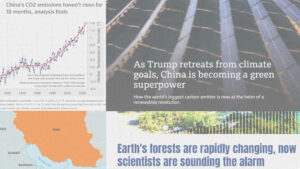
#69 | Frankly
Goldilocks Technology – A Preliminary Checklist
Description
As a problem-solving species, technology is an embedded part of the human experience – we assess, innovate, invent and adapt. But as we move out of the anomalous era we have just lived through and into less stable economic, social, geopolitical and ecological circumstances, humanity will require different kinds of innovation for a livable future.
In this Frankly, Nate offers preliminary guidelines for what might be termed ‘Goldilocks Technology’ – not too hot (dopaminergic gadgets) and not too cold (stone age tech) inventions for the future. Can governance upstream of designers and engineers use prices and policy to incentivize more appropriate and reliable technology? Can values and behavioral choices change demand, shifting the products available toward more sustainable options? What would the materials, supply chains, and disposal of technology that is ‘just right’ look like – and how would it change our wider boundary relationship with the biosphere?
Support The Institute for the Study of Energy and Our Future
In French, we have a motto that says that a simple drawing is often better than a long explanation. Jean-Marc Jancovici Carbone 4 President
That’s very understandable because with left atmosphere thinking, one of the problems is that you see everything as a series of problems that must have solutions. Iain McGilchrist Neuroscientist and Philosopher
We can’t have hundreds and hundreds of real relationships that are healthy because that requires time and effort and full attention and awareness of being in real relationship and conversation with the other human. Nate Hagens Director of ISEOF
This is the crux of the whole problem. Individual parts of nature are more valuable than the biocomplexity of nature. Thomas Crowther Founder Restor
Show Notes & Links to Learn More
Download transcript00:46 – The Carbon Pulse
00:51 – TGS Episode on Goldilocks Technology
02:46 – Planetary boundaries, Overshoot
03:28 – The Five Horsemen
05:35 – Elon Musk’s companies being supported by government subsidies
06:03 – Prices of inputs are wrong
06:11 – Shale oil is the source rock and finite, Art Berman on TGS
06:23 – The true cost of externalities
07:15 – Overton window
08:08 – Energy Primacy
09:00 – The move to a multipolar world
09:18 – Fragility of complex supply chains, reliance on cheap oil
10:07 – Auroville
10:25 – Bricks made from dirt
10:40 – Sodium batteries
11:16 – We recycle 8.5% of global supply chain
11:20 – Roman Krznaric
11:40 – Circular economy in Edo Japan
12:01 – Regenerative innovations, Regenerative economies
12:21 – Primary productivity
12:52 – Industrial Dairy Farms and Ecological Impacts
13:14 – Pricing to include ecological impacts
13:25 – Daniel Schmachtenberger, TGS Episode, link to Naive Progress Paper here as well
16:50 – Wide boundary thinking, Wide Boundary Frankly
18:07 – Optimal foraging theory
18:34 – Economic superorganism
18:44 – Contact movie






